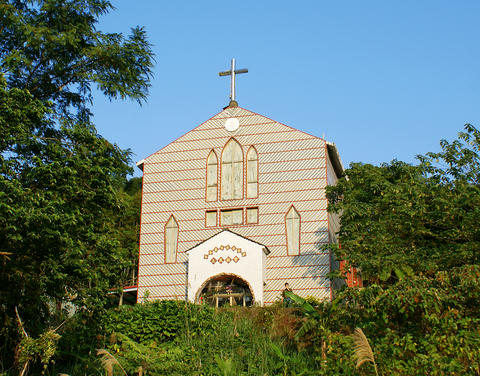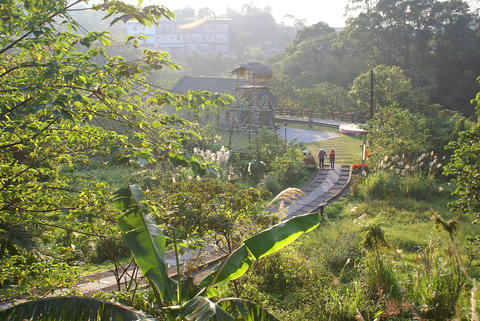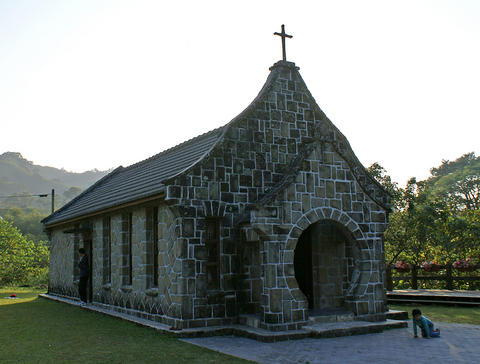The Tuba Church (基國派老教堂) stands in the middle of a well-manicured plot of land surrounded by marshy swamp near Sanmin Village (三民鄉), Taoyuan County. Made of stone, the house of worship was constructed over 40 years for indigenous Atayal (泰雅) Christians.
The tribe abandoned the small church in the early 1990s, however, because it couldn't accommodate the increasing number of believers. In 1994, a much larger church replaced the old stone structure, which is now a cultural center and museum. The contrast between the larger and smaller structures reveals the increasing influence of Christianity in the Atayal Aboriginal community.
Silan Ivan (卓武玉), caretaker of both churches and an Atayal, stands beside a wooden structure in the parking lot of the new church fastening red felt to the bottom of a frame made from particleboard, bamboo and plywood, while his wife unwinds Christmas lights. As Silan adds more felt the shape of a Christmas tree emerges. Inside the new church, Silan's daughter rummages through old boxes searching for tree trimmings, takes out a handful and places it around the tree.

PHOTO: NOAH BUCHAN, TAIPEI TIMES
"I remember when I was a child we held activities for Christmas in the old church," said the 68-year-old Silan, pointing to the stone structure 100m away.
"Different families brought food to the church and shared it together. We also exchanged gifts and played traditional games," he said.
Here in Sanmin, the Atayal tribe is celebrating Christmas with a mixture of Christian worship, such as Christmas Mass and decorating a tree, and Aboriginal customs that date back centuries. The Aboriginal traditions involve the idea of qutux niqan (exchange community, 共食團體), a custom derived from the tribe's ancient culture.

PHOTO: NOAH BUCHAN, TAIPEI TIMES
"[The Atayal] understand the idea of God through their traditional ideas," said Wang Mei-hsai (王梅霞), a professor of anthropology at National Taiwan University (NTU) who has researched the influence of Christianity on the tribe.
"There are many spirits and one of the spirits is God. For example, they can explain God as the ancestor of all spirits or the headman of all spirits," Wang said. In their daily life, members of the Atayal group still worship their ancestors and in their rituals they speak to their ancestors rather than God."
When Christian missionaries arrived in Taiwan in the 19th century, they traversed the country's mountains looking for converts. Wang said that though some conflicts exist between the Aboriginals and the Christian church, the Atayal have been adept at assimilating Christianity to their custom of ancestor and spirit worship.

PHOTO: NOAH BUCHAN, TAIPEI TIMES
The devotion shown by the Atayal is not shared by all of Taiwan's indigenous peoples. Ninety minutes west of Sanmin by car is Da-ai Village (大隘村), home to the Saisiyat (賽夏), Taiwan's smallest indigenous group.
"All the Saisiyat people went to churches and registered as church members but after the 90s they all returned to their traditional beliefs," said Hu Chia-yu (胡家玉), professor of anthropology at NTU. "So a lot of churches in Saisiyat villages have been. Most of them are closed."
On a recent visit, members of the tribe had no interest in speaking about churches, let alone what they were having for Christmas dinner.

PHOTO: NOAH BUCHAN, TAIPEI TIMES
Hu says that one important reason that many in the village rejected Christianity was because the church encouraged them to give up their Pasta'ay custom (巴斯達隘), also known as festival of the legendary little people, a ritual involving the entire group that is held biennially. Though roughly 20 percent of the population remains believers in some form of Christianity, Hu says few go to church and as time passes believers are becoming scarcer.
The Saisiyat are plains Aborigines and had early contact with Han immigrants coming to Taiwan in the 18th and 19th centuries. As time passed, the Saisiyat adapted various Chinese religious beliefs as part of their spiritual world view. Numerous shrines and temples can be found in the region.
Back in Sanmin, Silan laughs when asked if he plans on gobbling down turkey for Christmas dinner. "We eat food from the mountain," he said. "This generally takes the form of mountain vegetables and mountain pig."
Silan says his tribe follows the tradition of Christmas caroling, though it is a little different than what is found in the city. "Our believers are spread out over a wide area," he said. "So part of my responsibility is to drive children around to different households to sing Christmas carols," he said.

May 26 to June 1 When the Qing Dynasty first took control over many parts of Taiwan in 1684, it roughly continued the Kingdom of Tungning’s administrative borders (see below), setting up one prefecture and three counties. The actual area of control covered today’s Chiayi, Tainan and Kaohsiung. The administrative center was in Taiwan Prefecture, in today’s Tainan. But as Han settlement expanded and due to rebellions and other international incidents, the administrative units became more complex. By the time Taiwan became a province of the Qing in 1887, there were three prefectures, eleven counties, three subprefectures and one directly-administered prefecture, with

Taiwan Power Co (Taipower, 台電) and the New Taipei City Government in May last year agreed to allow the activation of a spent fuel storage facility for the Jinshan Nuclear Power Plant in Shihmen District (石門). The deal ended eleven years of legal wrangling. According to the Taipower announcement, the city government engaged in repeated delays, failing to approve water and soil conservation plans. Taipower said at the time that plans for another dry storage facility for the Guosheng Nuclear Power Plant in New Taipei City’s Wanli District (萬里) remained stuck in legal limbo. Later that year an agreement was reached

What does the Taiwan People’s Party (TPP) in the Huang Kuo-chang (黃國昌) era stand for? What sets it apart from their allies, the Chinese Nationalist Party (KMT)? With some shifts in tone and emphasis, the KMT’s stances have not changed significantly since the late 2000s and the era of former president Ma Ying-jeou (馬英九). The Democratic Progressive Party’s (DPP) current platform formed in the mid-2010s under the guidance of Tsai Ing-wen (蔡英文), and current President William Lai (賴清德) campaigned on continuity. Though their ideological stances may be a bit stale, they have the advantage of being broadly understood by the voters.

In a high-rise office building in Taipei’s government district, the primary agency for maintaining links to Thailand’s 108 Yunnan villages — which are home to a population of around 200,000 descendants of the Chinese Nationalist Party (KMT) armies stranded in Thailand following the Chinese Civil War — is the Overseas Community Affairs Council (OCAC). Established in China in 1926, the OCAC was born of a mandate to support Chinese education, culture and economic development in far flung Chinese diaspora communities, which, especially in southeast Asia, had underwritten the military insurgencies against the Qing Dynasty that led to the founding of